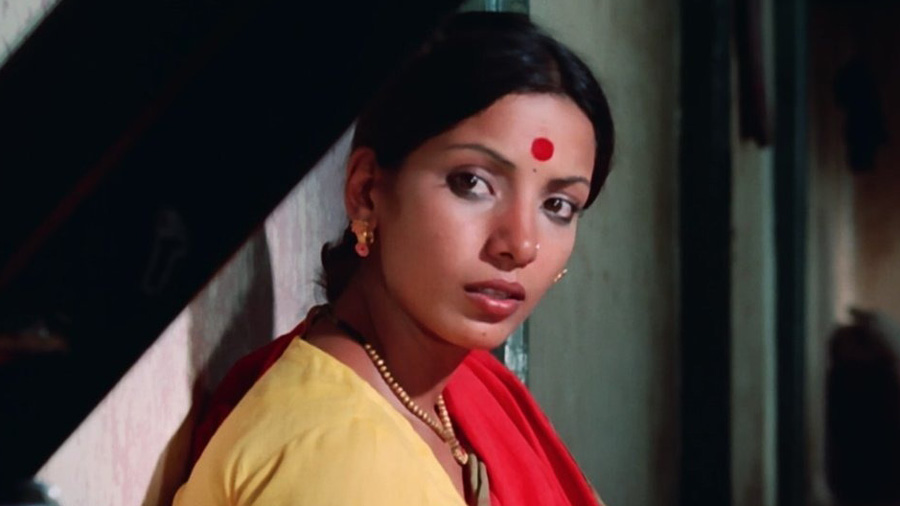Parallel cinema in India found its voice in the 1970s and ’80s through a bunch of young colts like Mani Kaul, Ketan Mehta, Saeed Mirza and Govind Nihalani. Leading that pack was a bearded young man called Shyam Benegal, who recorded through the lens the oppression faced by women in India from all walks of life and their unique ways to counter exploitation. In this, he was aided by versatile actresses like Smita Patil and Shabana Azmi.
On Benegal’s 88th birthday, we take a look at six female protagonists in the master filmmaker’s works — from the 1970s and ‘80s — who resist oppression by putting their body and mind on the line.
Lakshmi in Ankur (1974)
Shabana Azmi plays a Dalit woman in Shyam Benegal’s debut feature film Ankur. Benegal skilfully delves deep into the class and caste politics of rural India in this social drama, touching upon the intricacies of gender dynamics.
Lakshmi, who is a Dalit woman, lives with her deaf-mute alcoholic husband. She becomes pregnant by Surya (Anant Nag), the landlord’s son, when the latter shifts base to the village. She is humiliated by Surya’s wife, and her husband is wrongfully accused of a theft and punished. Despite her vulnerable condition, Lakshmi gets back at Surya, verbally abusing him for what he had done to them using his power and caste advantage. Shabana’s nuanced and subtle performance added a layer of relatability to Lakshmi’s complex character.
Sushila in Nishant (1975)
A constant fixture in Shyam Benegal’s big screen outings in the first two decades of his filmmaking career, Shabana Azmi plays Sushila, a middle-class village woman, in this social drama. She is abducted by Vishwam (Naseeruddin Shah), the younger brother of the village landlord. Her hapless school teacher husband (Girish Karnad) moves from pillar to post to bring the captors to justice. However, Sushila has already reconciled herself to playing the mistress of the powerful village man and cannot face her husband.
Benegal’s masterpiece is a moving document on the ill-treatment of women by men in power. It also sheds light on the psychological complexity of women brought up in such sociopolitical realities. Shabana captures Sushila’s fall from grace and eventual acceptance of her reality with surgical precision.
Bindu in Manthan (1976)
Manthan is a fictionalised depiction of the pioneering milk co-operative movement led by Verghese Kurien, making a strong case of rural development and women empowerment. Smita Patil plays a feisty young woman, Bindu, who helps young veterinary surgeon Dr Rao (Girish Karnad) set up a co-operative society dairy in her village. The higher-caste village headman (Kulbhushan Kharbanda) controls the dairy trade and is irked by Rao’s manoeuvres. The rigid caste practices are also a big stumbling block in his mission. Dr Rao, however, wins the trust of the women, inviting the wrath of the sarpanch.
Smita Patil’s natural charm adds a new dimension in her portrayal of Bindu. She switches between a range of emotions with effortless ease — from a fiery woman protective of her space to a woman who is not ashamed of her sexuality.
Usha in Bhumika (1977)
Based on the life of yesteryear’s Marathi screen actress Hansa Wadkar, Shyam Benegal’s Bhumika is headlined by Smita Patil. She plays an actress, Usha, who is in the prime of her career and leads a flamboyant ife. She gets her first break in movies courtesy of their family hanger-on Keshav (Amol Palekar) and eventually marries him after reaching the pinnacle of popularity. But Usha’s affairs with the men in the industry throws her marriage into a spin.
Smita slips into the shoes of Usha by putting in a memorable performance. Her transformation from a restive young girl into a mature woman is nothing short of a masterclass in acting.
Rukmini Bai in Mandi (1983)
Shyam Benegal’s 1983 classic Mandi is a refined commentary on the lives of sex workers and their social marginalisation. Aided by a stellar ensemble cast and an intelligent script, the director artistically translates a sensitive theme on screen.
Shabana Azmi plays Rukmini Bai, a brothel owner, in this drama. Her bordello is characterised by a loud cacophony of laughter, gossip and chaos. She often fires a volley of verbal abuses at the girls under her care, but is also protective of them. Unlike the stereotypical exploitative brothel owner, Azmi’s Rukmini Bai is sensitive and has accorded them the freedom to choose their clients. She treats it as any other form of labour and stands up to the local politicians and ‘respected’ members of society who treat them as pariahs.










